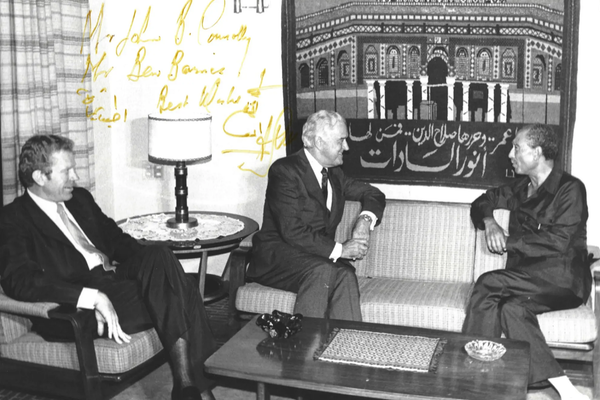H.W. Brands on Ben Barnes's "Revelation" about the Iran Hostage Crisis

Ben Barnes (l) and John Connally (c) meet with Egyptian President Anwar Sadat, 1980. Barnes has recently repeated claims previously made to historian H.W. Brands (and published in Brands's biography of Ronald Reagan) that this meeting was part of Connally's effort to delay the release of American hostages held by Iran to secure Reagan's election.
Peter Baker recently reported in the New York Times that Ben Barnes, a Texas politician and protegé of the former Texas governor John Connally, has chosen to speak out about a mission to the Middle East he and Connally took in 1980. According to Barnes, the purpose of meetings with a number of Middle East leaders was to encourage those leaders to convey to the Iranian government that it would be in their interest to delay the release of American hostages, a move damaging to the reelection effort of Jimmy Carter, and negotiate the release of the hostages with Ronald Reagan, whom Connally supported. Congressional investigations of the hostage crisis did not address Connally's trip.
Baker also reported that Barnes's claims were mentioned in H.W. Brands's biography of Ronald Reagan, and that Brands was one of four individuals Barnes identified as having previously heard the story.
Professor Brands agreed to answer some questions from HNN about Barnes's claims by email today, and how this "revelation" has been hiding in plain sight.
HNN: How did you come to speak with Barnes about Governor Connally’s trip to the Middle East?
While researching my book about Reagan, I asked Ben Barnes, whom I had known, if he had had any dealings with Reagan. In the conversation he mentioned his trip with John Connally to the Middle East in the summer of 1980. He told me that his trip with his old friend and mentor turned out to have a purpose beyond making Connally look like secretary of state material. Connally conveyed to governments and influential people in the Middle East that it would "not be helpful" - Barnes's characterization - to the Reagan campaign if the hostages were released before the election. I asked Barnes if that message came to Connally from William Casey, Reagan's campaign manager at that time; Barnes said he didn't know and didn't ask.
I followed up in some Connally papers at the LBJ Library to corroborate the journey. It checked out. There I also discovered a memo of a phone call from Nancy Reagan at the Reagan ranch to Connally on the trip. So Reagan was aware of the trip.
HNN: Did it make any waves when you wrote about Barnes’s account in your biography of Reagan?
Very little. I was surprised.
HNN: The idea that the release of the hostages was manipulated to harm Carter’s reelection bid is part of the lore surrounding the 1980 election, so it seems odd that a revelation like this would pass by unremarked. Is this a case of people’s responses being governed by their preexisting assumptions, or is it a case where the implications about American power and political tricks are too disturbing to discuss? Why is there a collective shrug, aside from the passage of 43 years?
The principals categorically denied any such thing. Watergate elevated the standard of evidence in such case to the "smoking gun." At the time there was no smoking gun.
HNN: Some critics, notably the media scholar Siva Vaidhyanathan, have questioned the veracity of Barnes’s account and the chain of events – specifically stating that Carter ultimately negotiated the release of the hostages, which was completed moments after Reagan’s inauguration in 1981, and that Connally’s lack of experience made him unlikely to be successful in such secret dealing. Do you think Barnes is credible about Connally’s intentions, and if so, should we think of Connally as an opportunist or a well-connected operator?
I find it very difficult to believe that Connally was free-lancing. William Casey was too canny to allow that. Furthermore, Casey seems to have had a second-track of backdoor communications with Iran, including a September meeting in Madrid with people who presented themselves as go-betweens. In 1980 this seemed outlandish. But after the Iran-contra scandal broke, it seemed entirely plausible. By then Casey was dead, and he had covered his tracks well.
I have known Ben Barnes for thirty years. And I find it very difficult to believe he was making this up.
HNN: Finally, how much should this cause us to rethink the 1980 election? Could this trip have changed the course of American history?
No, and here's why. By the summer of 1980, the hostages had lost their value to their captors. They were looking for a way to release them. But the last thing they wanted to do was help Carter get reelected. Carter was the reason the hostages were seized; the kidnappers thought Carter was planning to reinstall the shah (as Eisenhower had done in 1953). In effect, Connally and Casey were telling the Iranians not to do something the Iranians had no intention of doing. And far from the hostage release reflecting the Iranians' fear of Reagan, as the Reagan side spun things, the timing reflected their hatred for Carter and their preference for Reagan.